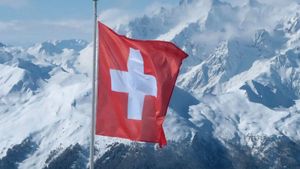Election night brought anxiety and tension for the Alliance Sahra Wagenknecht (BSW) as projections indicated its potential exclusion from Germany's Bundestag. Party leader Sahra Wagenknecht had gambled on the election being closely linked to her political future, declaring the election "a referendum on my political relevance." With projections fluctuated around the 5% threshold necessary for parliamentary representation, party insiders remained hopeful as the night unfolded.
Initial results showed the BSW struggling at around 4.7% according to ARD projections. Despite the gloomy forecasts, the party’s co-leader, Amira Mohamed Ali, remained optimistic, stating she was "very confident" about their chances, and Wagenknecht herself declared on the campaign trail, "Even if we don't make it above 5%, it’s not the end for the BSW.”
The BSW, launched just over a year ago, initially appeared poised for success after garnering significant support during state elections. The party's blend of left-wing social policies and conservative social principles seemed to resonate with voters and propelled them to double-digit support levels within certain states. Nevertheless, their ascent was halted by internal strife and external pressures.
Internally, the party faced disputes about joining coalitions with established parties, especially after significant electoral gains in regions like Thuringia and Brandenburg. Critics suggested this compromise could dilute the BSW's anti-establishment image, resulting instead in vague messaging. This perceived collapse of clarity led to confusion among potential supporters.
The premature call for new elections compounded their issues. Unprepared for the rigorous demands of campaigning, the BSW struggled to create clear messaging—particularly significant as their campaign focus shifted to the complicated geopolitical situation, including the war in Ukraine. Amidst the changing narrative, BSW faced growing competition from the AfD (Alternative für Deutschland) party, which appeared more appealing to erstwhile BSW voters, particularly around migration themes.
Following the closure of polling stations, hopes for securing parliamentary seats ebbed as preliminary data trended downward. Early projections by ZDF indicated the BSW hovered close to the elimination threshold as well, only showing slight improvements to the 5% mark.
The immediate aftermath of the polling was filled with mixed signals. While supporters at various watch parties hesitated to celebrate too soon, optimistic predictions began generating enthusiasm. Celebrations broke out when ZDF announced the BSW achieving 5%. "It's been hard fought and here we are!" enthusiastically proclaimed Steffen Schütz, the BSW’s state chairman for Thuringia, amid the cheering crowd.
Yet the political climate remains volatile. The success of the CDU/CSU, polling around 28.5%, contrasted sharply with projections for the BSW, which needed to secure its footing within the Bundestag. Even with some projections favoring their entry, the party’s campaign exposed underlying weaknesses undoubtedly hindering its ability to consolidate votes effectively.
The findings and predictions post-election unveiled contrasting sentiments among party leaders. Kaleidoscopic reactions spilled forth from party representatives, with CDU leaders rejoicing over their returns, framing their results as indicative of broader public dissatisfaction with the current coalition. “The traffic light has been liquidated,” stated CDU Secretary General Carsten Linnemann, heralding their revival after years on the sidelines.
For the SPD, heartbreak surrounded the event, labeled by internal leadership as the most stinging blow to their campaign outcomes. Olaf Scholz expressed deep reflection on their failures, acknowledging the political shifts and potential path toward coalition-building moving forward.
Turning outward, the dynamics branching from these elections explore the increasing polarization among German voters. While the BSW battles to cement its identity amid shifting loyalties and new emergent parties, other traditional parties too may feel the impact of these elections on future governance structures.
After the initial annals drawn, the results reveal some lessons too. Party spokespersons have commenced discussing the necessity to recalibrate their messaging strategy, emphasizing diversified issue focus to amplify voter engagement. Hints around upcoming political tactics suggest shifts away from singular-focused campaigns, aiming instead at broader constituent concerns and narratives. The BSW finds itself at another crossroads, prompted by these election outcomes, forcing them to confront their political narrative to solidify their next steps.
This election night not only signified the final tally of votes but painted the picture of complex political undercurrents throughout the nation, challenging both new and established parties amid changing electoral landscapes.



